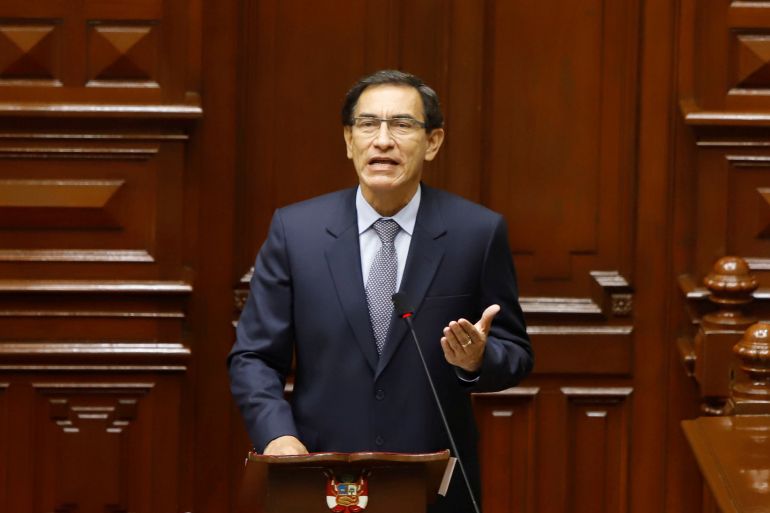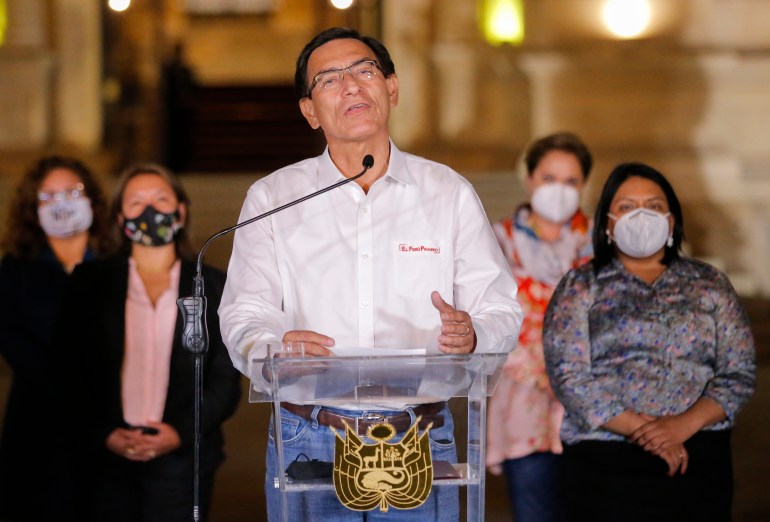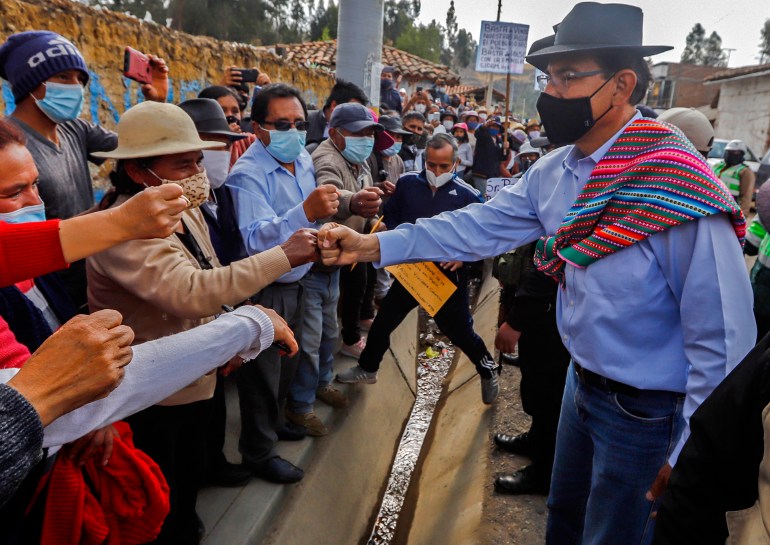Turmoil threatens Peru as Congress votes to impeach president
Martin Vizcarra says he will not challenge decision, as protesters take to streets to condemn impeachment.

Peru’s Congress voted on Monday to remove President Martín Vizcarra in an impeachment trial over corruption allegations, threatening further turmoil in a country struggling to recover from the coronavirus.
In a process that lasted eight hours, some 105 members of the opposition-dominated Congress voted to remove the centrist leader over accusations that as a governor he accepted bribes from companies that won public works contracts, in their second attempt to boot Vizcarra out in as many months.
Keep reading
list of 4 itemsPeru’s President Martin Vizcarra survives impeachment vote
Peru officials’ homes raided as part of presidential probe
Peru president reshuffles cabinet as COVID-19 takes its toll
Legislators needed to secure 87 votes out of 130 to remove him from office. There were 19 votes against and four abstentions.
“The resolution declaring the vacancy of the presidency of the republic has been approved,” declared Congress leader Manuel Marino, who under the constitution will take over the presidential functions until July 2021, which would have been the end of Vizcarra’s term.
Vizcarra has rejected the corruption allegations as “baseless” and “false” but in a speech outside the presidential palace after the vote said he would not challenge the decision. He reiterated that he had done nothing wrong and was willing to respond to any criminal charges.
The removal of a president with widespread public support thanks to his anti-corruption drive brings renewed political turmoil to the Andean nation as it tries to recover from an economic recession brought on by the coronavirus pandemic.
Nearly 35,000 people in Peru have died from COVID-19, the world’s highest per capita death-rate.
The next presidential and parliamentary elections are due in April.
“We are seeing here in Lima and in the north, people already expressing their disgust about this vote,” said Al Jazeera’s Mariana Sanchez reporting from the capital. “Many experts are saying this is a coup d’etat by legislators without any proof whatsoever of Vizcarra’s guilt.”
Pot-banging protesters took to the street around the Congress building in the immediate aftermath of Monday night’s vote and police clashed with pro-Vizcarra demonstrators a few blocks from the Congress building. Some waved signs accusing the Congress of a “coup”.

The corruption charges against Vizcarra do seem to have some basis to them. But most observers I’ve spoken with don’t think they rise to the bar of grave crimes that merit impeachment. Vizcarra himself had promised to submit to an investigation at the end of his term.
— Jo-Marie Burt (@jomaburt) November 10, 2020
Vizcarra’s presidency ended in a similar fashion to that of the man he replaced, Pedro Pablo Kuczynski, a former Wall Street banker who was forced to resign under threat of imminent impeachment over corruption allegations in 2018.
“Peru comes out weaker institutionally. Merino will be a weak president, that is the scenario in the context of general elections against the backdrop of a pandemic,” political analyst Augusto Alvarez Rodrich told the AFP news agency.
Vizcarra lacked a party in the fragmented Congress and frequently battled legislators over his anti-corruption agenda. The 57-year-old previously survived an attempt to remove him in September over alleged links to a case of irregular government contracts with a little-known singer. Only 32 in the chamber voted to oust him on that occasion.
In November, however, legislators voted to move forward with a new impeachment trial over accusations that Vizcarra accepted bribes from companies that won public works contracts when he was the governor of the southern region of Moquegua in 2014.
Economic strains
Vizcarra’s removal could usher in a period of uncertainty in the months leading up to elections as Peru is already strained by economic instability, analysts said.
“Political turmoil related to the latest impeachment process and corruption allegations add to deep distrust of the political class ahead of upcoming elections,” international consultancy firm Eurasia said in a report earlier on Monday.

Merino, an agronomist and businessman who is a member of minority party Popular Action, 59, will be sworn in at a special session of Congress on Tuesday, becoming Peru’s third president since 2016.
Vizcarra said that no fewer than 68 of the members of the 130-seat Congress seeking his impeachment were themselves subject to ongoing legal processes.
Last month, the Attorney General’s office announced it would investigate the allegations against Vizcarra when his term – and the immunity afforded by his office – ended in April, but Vizcarra’s opponents in Congress decided they could not wait.
Analysts said Merino could push some populist measures in the months leading up to Peru’s elections.
“He would probably maintain the existing economic policy framework but advance some populist measures as he tries to win public support,” Eurasia said.